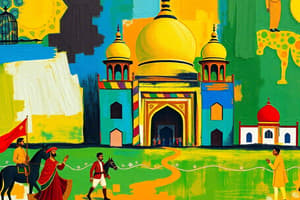Podcast
Questions and Answers
What was the impact of the British Raj on the Mughal Empire?
What was the impact of the British Raj on the Mughal Empire?
- It supported and strengthened the Mughal Empire
- It led to the restoration of the Mughal Empire
- It had no significant impact on the Mughal Empire
- It saw the decline of the Mughal Empire and the British took control of most of India (correct)
During which period did the Mughal Empire last?
During which period did the Mughal Empire last?
- 1757 to 1885
- 1526 to 1857 (correct)
- 1600 to 1700
- 1858 to 1947
What was the ultimate aim of the Indian Independence Movement?
What was the ultimate aim of the Indian Independence Movement?
- To gain independence from the Mughal Empire
- To strengthen British interference in religious matters
- To end British rule in India (correct)
- To establish a new political party in India
When was the Indian National Congress founded?
When was the Indian National Congress founded?
What event ended Crown suzerainty and partitioned British Raj into the Dominion of India and the Dominion of Pakistan?
What event ended Crown suzerainty and partitioned British Raj into the Dominion of India and the Dominion of Pakistan?
Study Notes
The history of India is a long and diverse story, with many empires and political regimes that came and go. The Mughal Empire and the British Raj were two of the most prominent and impacting regimes in India's history.
The Mughal Empire, which lasted from 1526 to 1857, was a period of effective rule that gave India's Muslims a sense of martial and administrative superiority, as well as a sense of separation from the Hindu majority The last of the Mughal emperors served as a rallying symbol for many mutineers in the 1857 rebellion, which is often considered the start of India's independence movement
The British Raj, which lasted from 1858 to 1947, was a period of direct British rule over the Indian subcontinent The British Empire's impact on India began in the 17th century, with the East India Company's defeat of the nawab of Bengal in 1757, which established the company as a major player in Indian affairs The British Raj saw the decline of the Mughal Empire and the British took control of most of India, either under their direct rule or indirect political control in a subsidiary alliance
The Indian Independence Movement, which lasted until 1947, was a series of historic events with the ultimate aim of ending British rule in India The movement took root in the Indian National Congress, which was founded in 1885 by an Englishman The movement gained more political representation and sought to end British interference in religious matters and change the type of rifle given to Indian soldiers The movement culminated in the Indian Independence Act 1947, which ended Crown suzerainty and partitioned British Raj into the Dominion of India and the Dominion of Pakistan
The Indian Independence Movement was a long and diverse story, with many key moments that impacted the movement's success. The 1857 rebellion, the Establishment of the Indian National Congress in 1885, and the Indian soldiers' contribution to World War I were all
Studying That Suits You
Use AI to generate personalized quizzes and flashcards to suit your learning preferences.
Description
Test your knowledge of the Mughal Empire, British Raj, and Indian Independence Movement with this quiz covering key events and significant historical periods in India's history.




